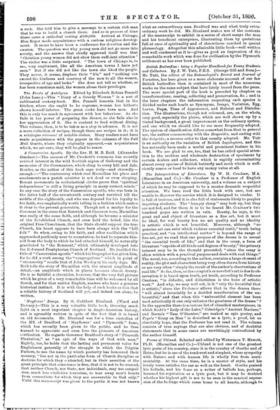The Interpretation of Literature. By W. H. Crashaw, MA. (Macmillan
and Co.)—Mr. Crashaw is a Professor of English Literature in an American university, and a volume on a subject of which he may be supposed to be a master demands respectful attention. We have read the little book with care, but are unable to discover the service which it is designed to render. It is full of truisms, and it is also full of statements likely to perplex inquiring students. The "hungry sheep" may look up, but they are not fed, and for them it is to be feared Mr. Crashaw's two hundred pages are written in vain. Beauty, he says, is the great end and object of literature as a fine art, but it must be ideal, for real beauty has no art quality and no ideality is artistic which is not beautiful. Moreover, although "no genuine art can exist which violates essential truth," truth being practical, and "an intellectual matter" is beyond the range of fine art, yet we read that one purpose of the drama is to reveal "the essential truth of life," and that in the essay, a form of literature "capable of all kinds and degrees of beauty," the primary interest may be in the thought presented, "since the essay is often written with a practical purpose and deals with real things." The novel, too, according to the author, contains a large element of reality, the plot and characters being very often drawn from history or are very often " simply the result of the author's observations of real life." So far, then, as the essayist's or novelist's art is due to ob- servation it is based upon truth, yet truth, according to Professor Crashaw, "is didactic, and didacticism is the bane of artistic work." And why, we may well ask, is it "only the beautiful that is artistic," since the Professor allows that in the drama there "will almost invariably be a decided manifestation of the un- beautiful," and that when this " unbeautiful element has been used artistically it can only enhance the greatness of the drama" ? In the appendix there is a curious list of classified masterpieces, in which Scott's "Lady of the Lake," Coleridge's "Ancient Mariner," and Burns's "Tam O'Shanter," are ranked as epic poetry, and Pope's "Essay on Man" is described as a lyric, a proof, let us charitably hope, that the Professor has not read it. The volume consists of true sayings that are also obvious, and of doubtful statements that in some cases are unwittingly contradicted by the author himself.










































 Previous page
Previous page